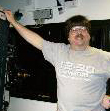|
|
 
|
|
Author
|
Topic: Hi Fi quality Vs. ones ears....
|
|
|
|
|
|
|
David Stambaugh
Film God

Posts: 4021
From: Eugene, Oregon
Registered: Jan 2002
|
 posted 08-03-2002 04:49 PM
posted 08-03-2002 04:49 PM





For the record, I "renounced" the pursuit of high-end audio perfection a long time ago as an exercise in futility and a waste of money.But playing devil's advocate: Most "golden ear" audiophiles believe there are certain characteristics of quality sound reproduction that cannot be accurately measured with instruments. For example, some speakers are much better at producing a convincing soundstage than others. Meaning you can sit in the sweet spot and close your eyes and convince yourself you are sitting in front of a live music source like an orchestra. I don't think there are any instruments that can measure that soundstage effect. But I've experienced it myself and I know some speakers are much better at this characteristic than others. Then you have to agree with the premise that the perfect audio playback system is like "a straight wire, but with gain". In other words, the goal is to reproduce what's in the grooves or on the CD as faithfully as possible to what was captured during the original recording session. [Audiophiles like to debate about the accuracy of the original recording too -- they frown on any EQ or other signal manipulation at the source. Hence their interest in "live to disk" recordings that use no EQ or multitracking or other tricks.] If you buy the "straight wire with gain" premise, then anything in the signal path that tampers with the original signal can only cause harm and a reduction in accuracy. Tone controls and equalizers fall in that category. "If your room's acoustics are bad, fix the room." Hence the popularity of expensive acoustical wall treatments, Tube Traps, and other stuff intended to tame acoustical problems.
| IP: Logged
|
|
Mark Seaton
Film Handler

Posts: 7
From: Glenview, IL, USA
Registered: Aug 2002
|
 posted 08-07-2002 12:12 PM
posted 08-07-2002 12:12 PM





I've been lurking around here for a little while and some of the things brought up in the last "Sub EQ" thread and other things prompted me to finally join so I could post. Of course the other thread was dead before I was able to post. For the record, I have no interest in a hi-fi cable debate. Just give me a proper amount of copper!I have an interesting mix of background experience where at one time I worked in the boutique high end world, and now work for a loudspeaker manufacturer heavily based in sound re-inforcement and installed sound(churches, clubs, auditoriums, etc.). I am also responsible for our offerings for high performance, personal theaters. Ahhh, if I had a nickle for all the misconceptions I've heard!
David wrote:
quote:
Most "golden ear" audiophiles believe there are certain characteristics of quality sound reproduction that cannot be accurately measured with instruments. For example, some speakers are much better at producing a convincing soundstage than others. Meaning you can sit in the sweet spot and close your eyes and convince yourself you are sitting in front of a live music source like an orchestra. I don't think there are any instruments that can measure that soundstage effect. But I've experienced it myself and I know some speakers are much better at this characteristic than others.
There are many reasons for beliefs that measurements cannot describe a sound system, but most are rooted in the fact that the general public doesn't want to have to interpret more than a single number to evaluate. While we can't quite generate a single number for imaging and soundstage, there are certainly measurements which can explain the differences. Some of the top consultants and designers literally have programs which can allow them to listen to the "sound" of a room which is modeled up in a computer, and the results are often QUITE close to reality... At least as close as the model is made to reality. Those who oppose EQs usually have not used them properly, or don't understand what can and cannot be corrected. In the low frequency range, most any system will benefit from EQ(prefferably parametric), but usually different EQ from what is useful for full range. Unfortuantely test gear can be used to give both good and bad data. An RTA is a prime example. A 1/3rd octave RTA hides many problems in it's lower resolution, where 1/6th octave most closely matches our ear's selectivity of the majority of the range. For low frequency analysis, we often want 1/12th octave resolution or better to really see what problems are there, and properly treat them. The comments about treating the room rather than diving in with EQ is quite true, as EQ should be the final tool used in fixing a system. An EQ cannot correct a time related problem, like a reflection, or sound eminating from a speaker at different times, like from a compression driver and a midrange. EQ can correct what is coming from a loudspeaker, but not what happens to it once it is in the room. Parametric EQ is useful for low frequencies as we can at least use a narrow filter to deprive resonant room modes of energy, making them less offensive. The matter of final perception is a quite difficult one, as there are many cases where simple changes in frequency response can result in observations of all sorts, none of which suggest that frequency response was changed. The same is true of small level changes. It is rare that a listener will identify a change in level, but instead they hear more or tighter bass, different soundstaging, brighter sound, and so on. Correlating our observations to measurements is the only way to make any progress toward a repeatable result. That is the end goal after all. Not that knowing what the measurements are will increase your enjoyment, but it allows you to have a method to produce a desired sound with less plug-n-play, and more knowledge. Regards,
| IP: Logged
|
|
|
|
|
|
All times are Central (GMT -6:00)
|
|
Powered by Infopop Corporation
UBB.classicTM
6.3.1.2
The Film-Tech Forums are designed for various members related to the cinema industry to express their opinions, viewpoints and testimonials on various products, services and events based upon speculation, personal knowledge and factual information through use, therefore all views represented here allow no liability upon the publishers of this web site and the owners of said views assume no liability for any ill will resulting from these postings. The posts made here are for educational as well as entertainment purposes and as such anyone viewing this portion of the website must accept these views as statements of the author of that opinion
and agrees to release the authors from any and all liability.
|

 Home
Home
 Products
Products
 Store
Store
 Forum
Forum
 Warehouse
Warehouse
 Contact Us
Contact Us




 Printer-friendly view of this topic
Printer-friendly view of this topic














